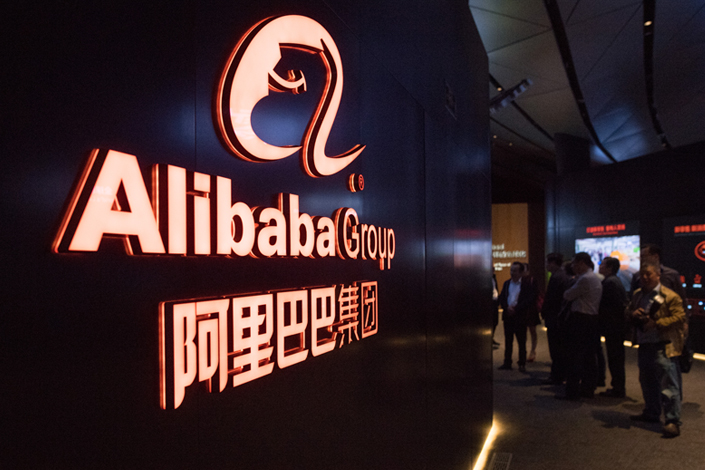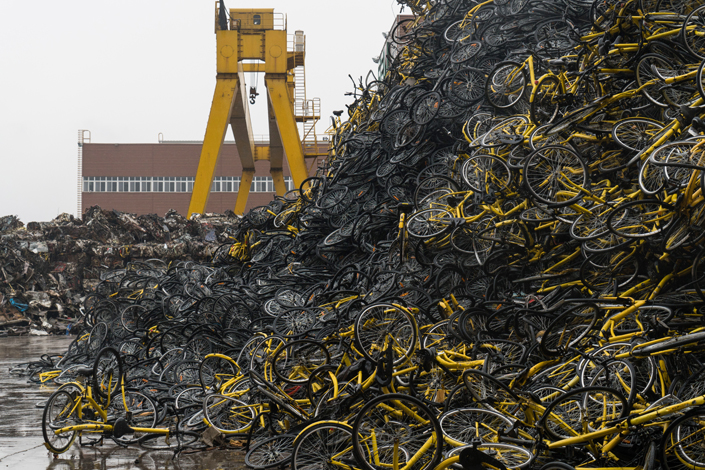Cover Story: Why China Faces Handicaps in Antitrust War With Tech Titans

China’s tech giants are feeling the squeeze as regulators step up efforts to rein in unfair competition and put the sprawling internet sector under unprecedented antitrust scrutiny.
E-commerce behemoth Alibaba Group Holding Ltd. found itself in the center of the regulatory storm as China’s market watchdog launched an investigation of the company Dec. 24, citing allegations of monopolistic practices. Two days later, top financial regulators summoned executives of Ant Group Co. Ltd., the fintech giant backed by Alibaba, telling the company to return to its business origins and imposing a series of requirements. That was a second blast against Ant after authorities forced the shelving of its mega initial public offering in November.
In the meantime, regulators signaled broader scrutiny of big tech companies’ transactions by issuing fines for several previous acquisitions. The State Administration for Market Regulation (SAMR) fined Alibaba 500,000 yuan ($76,500) for failing to seek approval before increasing its stake in department store chain Intime Retail Group Co. Ltd. to about three-quarters in 2017. China Literature Ltd., the e-books business spun off by Tencent Holdings Ltd., was also fined over a previous purchase.
Read more
In Depth: China Applies Closer Scrutiny to Sprawling Tech Acquisitions
The administration also said it’s reviewing the combination of DouYu International Holdings Ltd. with Huya Inc., which could create a Chinese game livestreaming leader akin to Amazon.com Inc.’s Twitch Interactive Inc.
Tech companies have felt rising tension since last year as regulators pushed forward a series of policies to regulate competition in the sector. In November, Beijing unveiled draft regulations that would establish a framework for curbing anti-competitive behavior such as colluding on sharing sensitive consumer data, alliances that squeeze out smaller rivals and subsidizing services at below cost to eliminate competitors.
Lawmakers are also making major revisions to the Anti-Monopoly Law for the first time in 12 years to give it more teeth. A draft revision unveiled earlier this year broadens the criteria used to assess a company’s control of a market and, for the first time, brings internet companies under the scope of the law.
There has never been an internet company penalized for violating China’s Anti-Monopoly Law, partly because it’s not easy to determine whether a player abuses its dominant market position in the new economy. This has sparked public criticism of excessive tolerance granted to the sector and the law’s lack of teeth.
Meanwhile, local authorities in charge of antitrust investigations have seldom made their findings public, fueling concerns over transparency. One person close to antitrust regulators said several cases are going on, but little information about them has been released.
In a November statement, the SAMR made clear that the antitrust law should apply equally to internet companies. At a key meeting in December, China’s Politburo vowed to strengthen anti-monopoly efforts in 2021 as it seeks to rein in what the top decision-making body called “disorderly capital expansion.”
 |
China’s market watchdog launched an investigation into Alibaba on Dec. 24 as part of a growing antitrust drive targeting the country’s sprawling internet sector. |
Changing attitude
The series of moves indicate that regulators are reversing a once laissez-faire approach toward the vast internet space since a few industry titans have emerged with sprawling business reach and market dominance. Chinese tech giants like Alibaba, Tencent and JD.com operate giant platforms linking social networking, e-commerce, travel booking and food delivery, and have accumulated millions of merchants and hundreds of millions of consumers. They face growing complaints of using their influence to threaten smaller rivals’ growth and hurt fair competition.
“Companies with market dominance benefited from competition but often turn to the opposite as they grow bigger, blocking fair competition and innovation as they grow bigger,” said one internet company employee.
Shares of Alibaba and Tencent, along with other Chinese tech majors, plunged amid the tightening signals. Alibaba’s U.S.-traded shares lost nearly $93 billion in value in two days following the Dec. 14 announcement of the antitrust probe.
Read more
In Depth: China’s Tech Giants Caught Between Tightening Scrutiny at Home and Abroad
In years past, regulators have been hesitant to tighten control over internet companies’ expansion because of concerns about hindering innovation, allowing tech companies’ new businesses to thrive outside proper oversight and push the boundaries of regulations.
“Without clear policy signals, it is difficult to deal with specific antitrust cases and enforce the law,” an antitrust lawyer said.
China has often “granted priority to industry policies instead of antitrust policies, putting growth ahead of regulation,” said Liu Junhai, a law professor at Renmin University in Beijing. However, “antitrust regulation is not contradictory to (efforts to) optimize the business environment. On the contrary, it helps to maintain fair competition order and enhance the vitality of the market,” Liu said.
Reining in monopolistic practices becomes more pressing as China pushes to expand domestic markets to counter growing uncertainties abroad. Under President Xi Jinping’s Dual Circulation strategy of expanding Chinese consumption alongside the export economy, a more vibrant, efficient and fully competitive domestic market is crucial.
Policymakers now face the test of seeking balance between protecting internet business growth and preventing anti-competitive practices, analysts said. If governments have the capacity to accurately identify and effectively restrain violations, they will be able to adopt more relaxed restrictions industrywide to give companies greater room to grow. Otherwise, they can only resort to strict restrictions to control businesses’ size, said Chen Hongmin, an economics professor at Shanghai Jiaotong University.
Antitrust enforcement in China also faces a major challenge in a lack of manpower. In 2018, the country consolidated previously scattered antitrust oversight into the SAMR. But the agency’s antitrust unit has only about 50 employees, compared to thousands at its EU and U.S. counterparts.
“Without expanding the team, it will be impossible to deal with the increasing number of antitrust cases,” a legal expert close to the agency said.
While the regulator struggles with tight manpower, tech giants are racing to hire retired judges and regulatory officials to help them respond to their new legal troubles. According to official data, more than 40 officials from the Ministry of Commerce joined enterprises after leaving government posts between 2014 and 2016.
“Such a phenomenon offers some big tech companies the ability of regulatory capture,” one legal expert said.
 |
A heap of abandoned shared-bikes. |
Abuse of influence
In the antitrust probe of Alibaba, regulators specifically cited the company’s practice of forcing merchants to “pick a side,” meaning working with exclusively Alibaba and shunning the platform’s rivals. Two of them, including JD.com Inc., and Pinduoduo Inc., have both previously complained of the practice.
In 2017, JD.com sued Alibaba accusing its archrival of using its market dominance to force merchants to terminate partnerships with JD.com. The high-profile case is still in the hearing process.
The 2017 clash prompted hundreds of garment retailers to leave JD.com’s platform, hurting the company’s strategy of expanding from electronics products into more consumer goods, Caixin learned. One retailer told Caixin that merchants decided to sign exclusive partnerships with Alibaba’s Tmall marketplace after assessing the impact on traffic access and business potential.
Big platform operators like Alibaba can easily punish merchants that don’t cooperate by reducing new traffic to their sites or downplaying them in searches, the retailer said. It also makes merchants hesitant to stand up to the platforms in lawsuits, a JD.com source said.
In a high-profile feud last year, top microwave-oven brand Galanz sued Alibaba for allegedly abusing its market dominance by forcing merchants to “pick a side” when deciding where to sell their wares online. Galanz told Caixin in June that it withdrew the lawsuit after reaching a settlement with Alibaba, without giving details.
“Pick a side” can have a number of meanings, including limiting a merchant’s sales presence to one platform or choosing a single platform for promotions during big shopping holidays. Under pressure, some merchants deliberately obscure their brands on smaller platforms or modify products for different platforms, industry sources said.
The “pick a side” phenomenon gained attention again after food ordering giants Meituan and Ele.me reignited a turf war during the pandemic lockdown last spring. A restaurant owner told Caixin that Meituan punished shops that worked with both platforms by removing them from its search.
“You can’t find the shop (on the app) even when you stand just outside it,” the person said.
The “pick a side” practice is banned as a monopolistic practice under several laws and regulations including the Anti-Unfair Competition Law and E-Commerce Law. However, the maximum penalty of 3 million yuan is far from enough to deter tech giants, experts said.
Meanwhile, there are always difficulties in determining abuse and collecting enough evidence against such practices under antitrust law because of a lack of clear descriptions regarding activities in the new economy, several legal experts said.
China should learn from the European Union, which in the newly issued Digital Markets Act and Digital Services Act clearly lists the do’s and don'ts for tech companies, experts suggested. Following a similar approach would make antitrust enforcement in China much easier, they said.
Antitrust regulation of internet companies should take effect as early as possible to avoid systemic risks and heavy costs, said Liu Xu, a researcher at the National Strategy Institute of Tsinghua University.
Contact reporter Han Wei (weihan@caixin.com) and editor Bob Simison (bobsimison@caixin.com).
Download our app to receive breaking news alerts and read the news on the go.

- PODCAST
- MOST POPULAR






